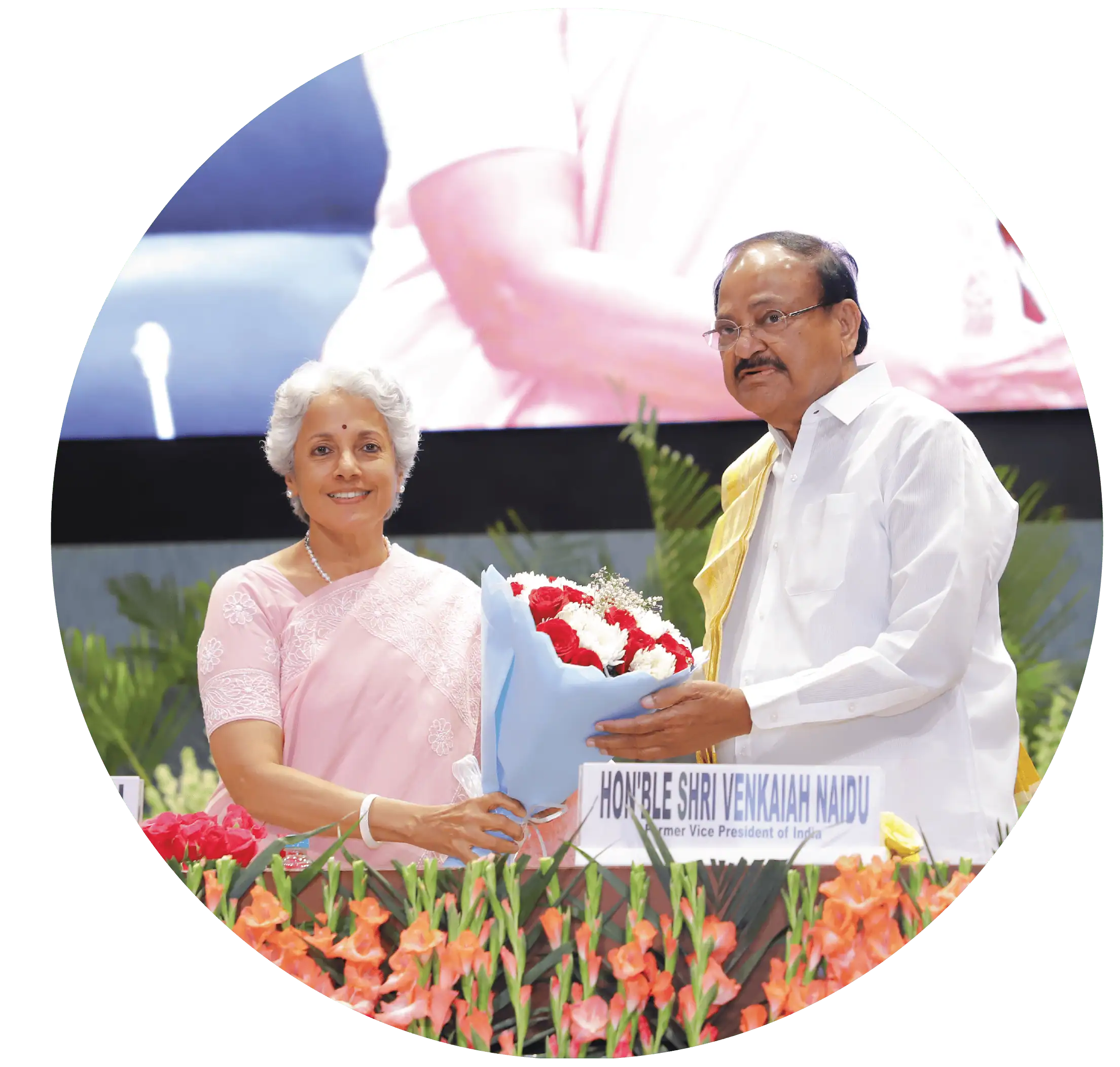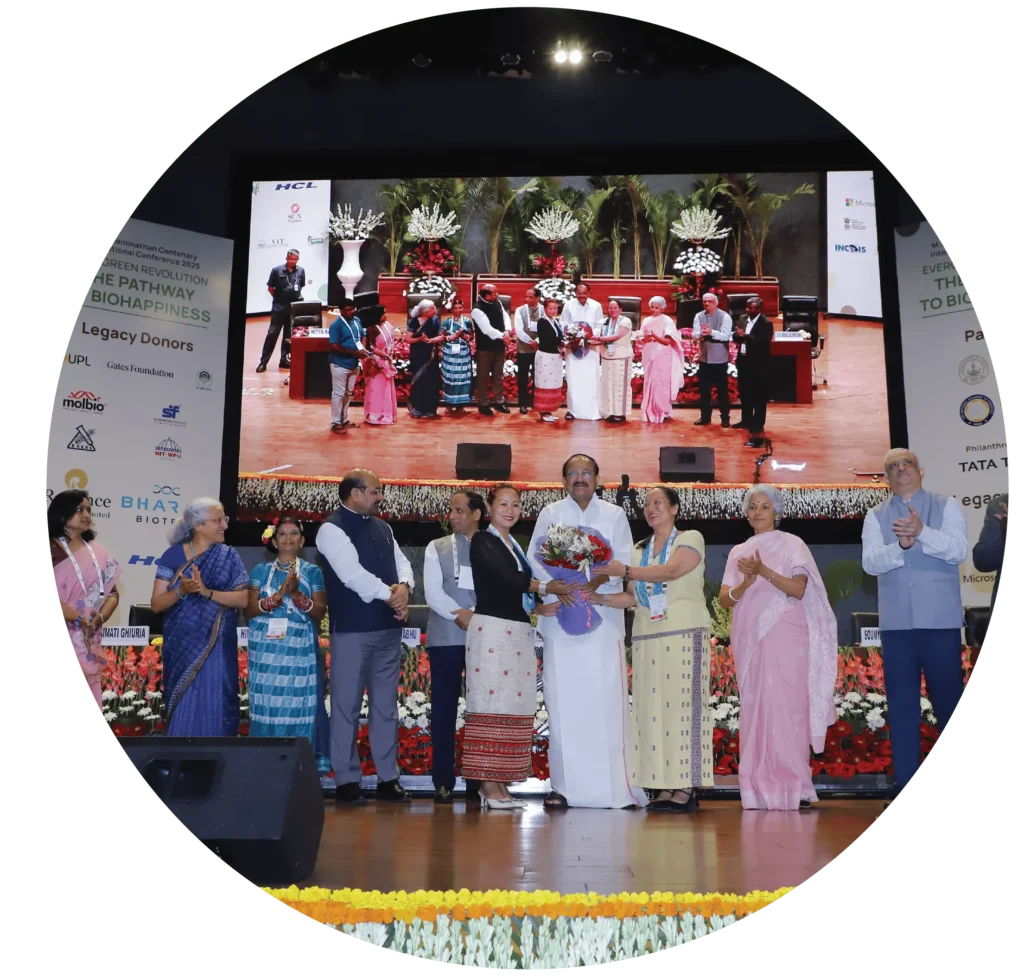Monday, 23 February 2026

Former Vice President M. Venkaiah Naidu presides over Valedictory as global delegates endorse a Transformative Action Plan
On the momentous occasion of the birth centenary of Professor M.S. Swaminathan—the father of India’s Green Revolution and a global champion of sustainable development—the International Conference on Evergreen Revolution – The Pathway to Biohappiness concluded today with a resounding call for transformative change. Over 1,000 delegates from across the world, including scientists, policymakers, farmers, youth, civil society leaders, and representatives of international organisations, gathered in New Delhi from August 7–9, 2025 to honour his legacy and forge a bold new path forward.
The conference reaffirmed Professor Swaminathan’s vision of a world where science serves the vulnerable, ecological balance coexists with food security, and innovation uplifts human dignity, equity, and well-being. In the face of mounting global challenges—including climate change, biodiversity loss, pandemics, unsustainable resource use, and deepening inequality—delegates united in calling for a new social contract between people and nature, rooted in the principles of the Evergreen Revolution and inspired by the ethos of Biohappiness.
Defining Biohappiness
Biohappiness was adopted as a guiding framework for human and planetary well-being—one that emerges when biodiversity is conserved and wisely utilised for development, livelihoods, and health. This vision seeks a future in which every person is nourished and healthy, every farmer is empowered and respected, and every ecosystem thrives and regenerates.
Ten Priorities for Global Action
Delegates endorsed a comprehensive Global Call to Action structured around ten interlinked priorities. They urged a rethinking of food and farming systems to make them biodiversity-based, climate-resilient, and nutrition-sensitive, while restoring soils, conserving water, and promoting underutilised crops. They emphasised the strengthening of farmer-managed seed systems by protecting farmers’ rights, preserving traditional varieties, and supporting participatory crop improvement.
The conference called for technology and innovation to be deployed with equity at its core—harnessing AI, digital platforms, advanced breeding, and biotechnology ethically, affordably, and safely. Research must be democratised, bridging formal science with indigenous knowledge and ensuring that farmers’ needs drive the agenda. Policy and governance pathways should embed Evergreen Revolution principles, decentralise decision-making, and invest in rural infrastructure, research, and extension.
Social equity and gender justice were identified as non-negotiable pillars, with a strong focus on women’s land rights, equal access to resources, and youth-led innovation. The role of the private sector was acknowledged, provided it works responsibly to build nature-positive value chains, fair markets, and affordable technologies. On a broader scale, delegates urged a rethink of global development, integrating the Biohappiness framework into food systems and climate finance, and deepening South–South cooperation.
The action plan further underscored the importance of research and communication in countering misinformation, using foresight tools, and amplifying the voices of smallholders, women, and youth. Finally, delegates called for mainstreaming the One Health approach—recognising the interdependence of human, animal, plant, and ecosystem health—to address pandemic risks and nutrition-related diseases.

A Valedictory of Commitment and Leadership
Presiding over the valedictory ceremony, Former Vice President M. Venkaiah Naidu lauded the conference for advancing a bold, inclusive, and science-driven roadmap, urging all stakeholders to act with urgency and unity. In his address, he underscored the moral imperative to translate this action plan into tangible results that reach farmers, communities, and ecosystems worldwide.
Global Call for Action on Biohappiness 2025
The final declaration reaffirmed the commitment to achieving zero hunger, zero poverty, and zero biodiversity loss, positioning Biohappiness as a new development paradigm blending traditional wisdom with modern science. It announced the launch of a Decade of Action on Forgotten Foods to revive neglected species for nutrition, livelihoods, and climate resilience, while making gender and social justice central to all transformation efforts.
Delegates pledged to adopt data-driven, people-centred strategies to address the interconnected challenges of climate change, health, agriculture, livelihoods, and equity. They committed to scaling up indigenous practices and farmer-led innovations through national policies, establishing a Global Coalition on Biohappiness to connect research, policy, and grassroots action across countries, and integrating nature-positive, community-led food systems into national agendas. Mainstreaming the One Health approach was affirmed as a priority to safeguard planetary health for generations to come.
As the conference closed, delegates pledged to carry forward Professor Swaminathan’s legacy boldly, inclusively, and urgently, recognising that if agriculture falters, the entire edifice of human well-being is at risk. This call to action is intended not merely as a commemoration, but as a catalyst for a global movement towards social justice, sustainability, and collective prosperity.